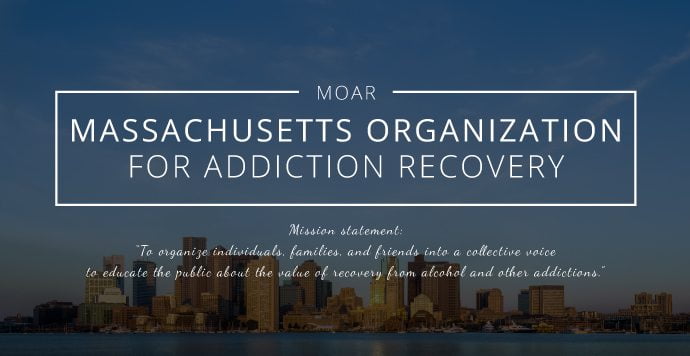With only a few words, the Massachusetts Organization for Addiction Recovery (MOAR) sums up the power that honesty and outreach can have within the realm of substance use and addiction advocacy. Simply put, their mission statement reads: “To organize individuals, families, and friends into a collective voice to educate the public about the value of recovery from alcohol and other addictions.”
The History Of MOAR
The Massachusetts Organization for Addiction Recovery exists because of the very people it seeks to support: individuals in recovery. In the beginning, MOAR was actually the Massachusetts Organization of Americans for Recovery. In 1998, that changed as MOAR took on the name that it stands behind now, and due to a Substance Abuse and Mental Health Services Administration grant, it joined the New England Alliance for Addiction Recovery. Originally conceived by MOAR mentor Leroy Kelley, a second individual, Maryanne Frangules, took on this important mission, leading her to become MOAR’s current Executive Director. With these individuals at the helm and a host of recovery advocates working together, MOAR has, since its inception in 1991, grown to become the influential organization that it is now.
Changing Perspectives, One Person At A Time
MOAR seeks to shift the general public’s perspective from what may, at times, be a negative and fairly narrow-minded focus of the detriment and impact that alcohol and drug addictions exert upon the residents of Massachusetts. Though these things are vastly important and their mission does not in any extent attempt to downplay the seriousness of the situation, MOAR seeks to create an enriched and broadened dynamic that presents recovery as a venue to foster hope and greater enthusiasm towards treatment and advocacy. Beyond this lies the countless lives that have been changed—the many individuals and their families or other support systems—that have faced addiction head-on and won. That is the power of treatment and that is the story that MOAR wishes to spread. MOAR does not ignore the reality; instead, it is the numbers that spurn it forward, giving the organization and its members greater urgency and focus as they work towards creating a more engaging and honest conversation about substance use and recovery that fights for the pursuit of greater education, outreach, and treatment. What is empowering and vital about this shift in perspective is the resources it places within the hands of those who seek to connect by it, changing the conversation and in turn, the access that this life-changing mission grants. [inline_cta_four]
How Does MOAR Promote And Engage Their Mission?
The public awareness that MOAR seeks to promote is continuously reinvested in by their efforts to recruit new individuals that are walking their own personal journeys of recovery, including families, friends or any other individuals who have been positively affected by recovery. MOAR uses what they term as “recovery messaging tools” to spread the word about their group while teaching the public about the benefit that treatment and recovery have within our society as a whole. They even have a wealth of information that can help people support each other in recovery; find their guide here. An addiction simply does not concern just the individual alone. Instead, it affects the families, communities and different social entities surrounding a person in a way that has a deep impact on a sociopolitical, economic and vocational level. MOAR believes, through greater transparency and honesty, that we can begin to change these effects in a powerful way.
What Does Their Mission Seek To Change?
Here, we share with you MOAR’s objectives as extracted from their webpage:
- Open access to prevention, treatment and recovery support
- Support for All Pathways to Recovery
- Removal of administrative obstacles to the above
Their mission recognizes the numerous ways that drug and alcohol addiction shapes our citizens, families, and society as a whole, and develops goals that can help to alleviate the impact of these things, by instead replacing them with positive and proactive steps towards change. The following objective titles were taken from their website, with the information paraphrased from their materials regarding the milestones they hope to reach. Education — Education is a cornerstone of any substance use awareness initiative. MOAR is no different. They desire that students have an easier time obtaining information about substance use and addiction by proposed measures to offer peer education, student assistance programs, and counselors and more active integration of recovery concepts within a high school. They also assert that all health care providers should have more official instruction about substance use and recovery. Insurance — The sad truth is, paying for addiction treatment is challenging for many people and many times, people don’t seek or obtain treatment because of financial reasons. MOAR endeavors to remove this barrier, providing individuals in need with greater access to treatment for an amount of time that is suitable and geared towards their needs, whether it be inpatient or intensive outpatient treatment. In the case of the former, by ensuring coverage for long-term treatment and supplemental recovery support options that can help to protect against relapse. They design to make this a more viable reality by better reimbursement for licensed drug and alcohol clinicians, and greater parity, meaning that each individual seeking treatment has access to an equal standard of coverage for their substance use and mental health treatment needs. Adolescent and Family Services — Again, addiction doesn’t just affect the person who is taking the drugs or alcohol, instead, their family can suffer at the hand of this devastation. To alleviate this burden, MOAR wants to see more family support led by peers, greater services designed for youth and family, and for adolescents that are in need of treatment, recovery centers in every county within Massachusetts that are geared towards this younger demographic of people. Housing — When a person finds themselves overcome by substance use or addiction they very commonly experience a great sense of instability. Many times, they may have lost important parts of their life within their pursuit to find and use drugs or alcohol. These instabilities and lack of structure can increase a person’s odds of continuing or relapsing to substance use. MOAR recognizes the need for greater availability of sober, and eventually, permanent housing options. Licensed Recovery Homes — Treatment can mean the difference between a life that continues to be overrun by the damage and health risks associated with substance use, or a better, more stable, drug-free life. Sadly, today there is yet a vast discrepancy between the number of individuals who need care and those who receive it. MOAR is focused on changing this by improving facilities that already exist, increasing funding to treatment programs, developing the network of entities committed to providing treatment and offering better access to treatment programs that integrate work experience. With these improvements, a person enters back into their life with a greater skill set to help them obtain a more balanced and fully-functioning way of life. Recovery Support — Treatment is not the end-all to sobriety. Instead, a person must continuously reinvest in their recovery. MOAR hopes to give people a larger platform on which to base their recovery by seeing connections to Peer to Peer Recovery support services, recovery centers, and recovery coaching grow. Criminal Justice Addiction Recovery Support — MOAR acknowledges the vast impact that drugs and alcohol have within our criminal justice system and seeks to advocate amendments to the perimeters of the current sentencing guidelines that affects this population. In addition, they seek to impact the lives of those who are already incarcerated by improving the treatment services that are offered, while granting even greater accessibility to these programs. In order for these individuals to have a chance at the most lasting benefit of this treatment, they propose that our system takes reentry support far more seriously.
How MOAR Addresses Advocacy On A Political Level
The power of change within recovery exists on many levels. The Massachusetts Organization for Addiction Recovery equips its members with the critical skills and knowledge to prepare them in addressing political issues. Members can then initiate a public policy campaign with clearly delineated and actionable steps, keeping them up to date with current legislation. For instance, they break down ACT S2022, Massachusetts’ policy that is directed towards treatment, so that citizens can better understand the state’s stance on substance use care and recovery directives.
Be A Part Of The Change
Whether it be for you or someone else, a successful recovery is possible. If you’re interested in learning more about recovery, including treatment options and insurance concerns, or about MOAR, please reach out to drug rehab in Massachusetts today.













